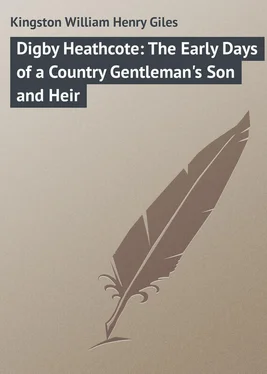William Kingston - Digby Heathcote - The Early Days of a Country Gentleman's Son and Heir
Здесь есть возможность читать онлайн «William Kingston - Digby Heathcote - The Early Days of a Country Gentleman's Son and Heir» — ознакомительный отрывок электронной книги совершенно бесплатно, а после прочтения отрывка купить полную версию. В некоторых случаях можно слушать аудио, скачать через торрент в формате fb2 и присутствует краткое содержание. Издательство: Иностранный паблик, Жанр: foreign_prose, foreign_children, на английском языке. Описание произведения, (предисловие) а так же отзывы посетителей доступны на портале библиотеки ЛибКат.
- Название:Digby Heathcote: The Early Days of a Country Gentleman's Son and Heir
- Автор:
- Издательство:Иностранный паблик
- Жанр:
- Год:неизвестен
- ISBN:нет данных
- Рейтинг книги:5 / 5. Голосов: 1
-
Избранное:Добавить в избранное
- Отзывы:
-
Ваша оценка:
- 100
- 1
- 2
- 3
- 4
- 5
Digby Heathcote: The Early Days of a Country Gentleman's Son and Heir: краткое содержание, описание и аннотация
Предлагаем к чтению аннотацию, описание, краткое содержание или предисловие (зависит от того, что написал сам автор книги «Digby Heathcote: The Early Days of a Country Gentleman's Son and Heir»). Если вы не нашли необходимую информацию о книге — напишите в комментариях, мы постараемся отыскать её.
Digby Heathcote: The Early Days of a Country Gentleman's Son and Heir — читать онлайн ознакомительный отрывок
Ниже представлен текст книги, разбитый по страницам. Система сохранения места последней прочитанной страницы, позволяет с удобством читать онлайн бесплатно книгу «Digby Heathcote: The Early Days of a Country Gentleman's Son and Heir», без необходимости каждый раз заново искать на чём Вы остановились. Поставьте закладку, и сможете в любой момент перейти на страницу, на которой закончили чтение.
Интервал:
Закладка:
“Look at the other wheels,” said a voice.
It was that of Mr Bowdler. His mind had misgiven him that the trick which he had discovered might have been played to other carriages, and he had driven back. He returned to the coach-yard and warned the coachmen of what he suspected. He found them in a state of great commotion, all crying out for the things they had lost, one accusing the other of having appropriated them. Their anger was still further increased when, in accordance with Mr Bowdler’s advice, they discovered the linch-pins had been abstracted from several of the carriages, and that the necks of some of them had narrowly escaped being broken. They were loud in their threats of vengeance on the heads of the unknown ragamuffins who had committed the atrocious act.
“It’s they gipsies,” said one; “they’ve done it to rob the ladies as we drove along.”
“It’s some on old Dame Marlow’s tricks. I don’t think az how any one could a come in here to play zick a prank,” observed another, a believer in the Dame’s powers.
Some, however, ventured to suggest that as there were young gentlemen at the Hall, and young gentlemen did play very bad tricks at times, they might have done it. Opinion was setting very much in this direction, when John Pratt appeared, and was highly indignant that any such reflection should be cast on his young master.
Mr Bowdler having assured himself that no more harm was likely to occur, drove away again.
“I am not justified in allowing the boys to go on in this way,” he said to himself. “I must inform Mr Heathcote of what has occurred, and get them sent to where they will be properly looked after; I should like to get them separated; one will learn no good from the other.”
Meantime the disturbance in the coach-yard increased, and John Pratt had at last to summon his master from the ball-room to quell it. Mr Heathcote’s voice was now heard inquiring what was the matter, when a dozen people tried to give their own versions of the state of affairs.
“Very well, my friends,” said Mr Heathcote, after listening to them patiently, “keep the peace among yourselves for the present, and if the culprits can be discovered, I will take care, I promise you, that they shall be properly punished. And John Pratt, get more lanterns, and have all the things in the carriages collected, and distributed to the proper owners as they are claimed.”
Having said this, the master of the house returned to his guests. Julian and Digby, when they heard what Mr Heathcote had said, were in a great fright. Digby knew very well that what his father said he would do – that he assuredly would do. He had no hope of escaping detection, and was certain that he should be punished. Of course, he remembered that he had not actually taken the linch-pins out of the carriages, but he had stood by, if not aiding and abetting, at all events not making any strenuous effort to prevent the deed. He, therefore, never for a moment dreamed of sheltering himself under the plea that he had not touched the linch-pins. It scarcely occurred to him that Julian might have exonerated him in a great degree by generously declaring that he himself had proposed the trick and had carried it out. Had he been in Julian’s place, that is what he would have done; but he did not ask Julian to act thus for him, and he made up his mind to abide the consequences. He felt that any excuse he could offer for himself would throw more blame on Julian, and it did occur to him that even then his word might be doubted.
In the meantime Mrs Fuller’s carriage was put to rights, the coachman mounted on his box, the ladies were handed in, and the young gentlemen got up once more on the rumble, all of them very angry and annoyed, as well they might be, and some not a little bruised. Mr Heathcote assured them of his vexation at what had occurred, and promised them, as he had the coachmen, that he would get the culprits properly punished.
The party at length separated, and Digby, more unhappy and discontented with himself than he had been for a long time, went to bed and cried with very vexation till he fell asleep. It was a pity that his repentance was not of a more permanent nature.
The next morning he arose refreshed, and though he felt an unusual weight at his heart, yet he looked at things in a brighter light. Julian looked immaterial (as Kate called his expression of countenance) when he came down to breakfast, and had evidently made up his mind to brazen out the affair, should suspicion fall on him. The event of the evening naturally, however, became the subject of conversation, and Digby felt conscious that he was blushing, while he dared not meet the eye of any one present. He eat away perseveringly at his breakfast, and bolted so hot a cup of tea, that he scalded his mouth, and was about to make his escape, when his father’s eye fell on him. Digby knew it, though he did not dare to look up, and Mr Heathcote felt very nearly certain that the culprit was his own son. Had he doubted it much, he would have asked him, in joke, if he could tell how the affair happened; but he was silent, and felt sad and annoyed. He was sorry to suppose that Digby had been guilty of so foolish and really wicked an act, and his pride too, of which he had a good deal, was hurt at the thought of having, in accordance with his word, publicly to punish him.
All doubts were at an end when, in a short time, Mr Bowdler appeared, mentioned what he had ascertained, and firmly recommended the course he thought ought to be pursued.
“You are right,” answered Mr Heathcote, “but he is such a child – it seems to me but the other day that he was a baby. Let me see, how old is he? Ah, to be sure, I went to school at an earlier age. Old or young, I am bound to punish him, however. Yet stay, we have no right to condemn him unheard.”
Mr Heathcote rang the bell, and ordered the servant to send in Master Digby to him. He felt very like that Roman father we read about, who condemned his own son to death.
“Digby,” said Mr Heathcote, when his son and heir stood before him, “did you take the linch-pins out of the carriages last night?”
Digby thought a moment.
“No, I did not,” he answered firmly.
“Do you know anything about the matter,” said Mr Heathcote, somewhat astonished but firmly believing the assertion. Oh what a blessed thing is that perfect confidence in the honour and truthfulness of those connected with us.
“Do you say that I must answer that question, papa?” said Digby.
“I do not wish to force you to say anything,” remarked Mr Heathcote, “but I do wish to ascertain how the circumstance occurred.”
Digby thought for some time, while his father sat looking at him.
“I should like to know how you intend to punish the person who committed the mischief,” he said at last.
“If you had done it, I should probably have flogged you, and have sent you off to school, as soon as I could find a suitable one. That would have been a lenient punishment for you. A poor boy would be flogged and sent to the house of correction.”
“Then you must send me to school, papa, though I should be glad if you would omit the flogging,” replied Digby, frankly. “I will not say who played the trick; but, as I see somebody ought to be punished, I’m ready to suffer, as I think I ought.”
Mr Bowdler was very much interested in hearing this conversation, and certainly thought very much better of Digby than he had before been inclined to do. “There is a great deal in that boy which may bring forth good fruit, if it is properly developed,” he said to himself. It made him very anxious that Digby should go to some school where the moral as well as intellectual qualities of the boys were attended to.
Mr Heathcote did not wish to press the matter further on his son. He was convinced that he was innocent of the act committed, and he had no doubt of the real delinquent. Still he was very unwilling to have to punish Julian, and he wished to pass the matter over, unless the boy was positively accused before him of the crime. Digby was told that he might go back to the schoolroom and prepare for Mr Crammer.
Читать дальшеИнтервал:
Закладка:
Похожие книги на «Digby Heathcote: The Early Days of a Country Gentleman's Son and Heir»
Представляем Вашему вниманию похожие книги на «Digby Heathcote: The Early Days of a Country Gentleman's Son and Heir» списком для выбора. Мы отобрали схожую по названию и смыслу литературу в надежде предоставить читателям больше вариантов отыскать новые, интересные, ещё непрочитанные произведения.
Обсуждение, отзывы о книге «Digby Heathcote: The Early Days of a Country Gentleman's Son and Heir» и просто собственные мнения читателей. Оставьте ваши комментарии, напишите, что Вы думаете о произведении, его смысле или главных героях. Укажите что конкретно понравилось, а что нет, и почему Вы так считаете.












